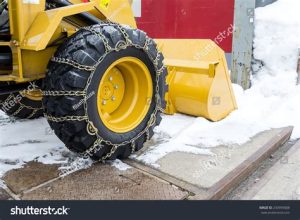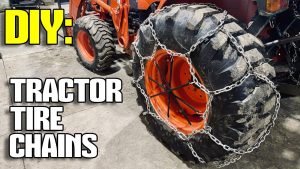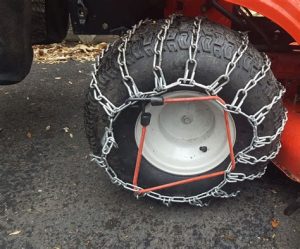Explore the classification, benefits, materials, selection, and maintenance of tractor tire chains for improved performance and safety in challenging conditions.When it comes to maximizing the efficiency and safety of your tractor in various weather conditions, understanding the different types of chains for tractor tires is essential. These chains not only improve traction on slippery surfaces but also enhance the longevity of your tires. With a range of options available, selecting the right chain can make a significant difference in performance, whether you’re navigating snowy fields or muddy terrains. In this blog post, we’ll explore the classification of tractor tire chains, delve into the benefits they offer, discuss the common materials used in their construction, provide guidance on choosing the right type, and share tips for proper maintenance. Equip yourself with the knowledge to make informed decisions and ensure your tractor is prepared for any challenge Mother Nature throws your way.
Classification of tractor tire chains
Tractor tire chains can be a critical component for enhancing traction and safety during various agricultural and off-road activities. They are primarily classified based on their design, configuration, and material. Understanding these classifications will help you choose the right type of chain for your specific needs.
| Type of Chain | Description | Best Use |
|---|---|---|
| Link Chains | Traditional chains made from metal links, providing excellent traction. | Ideal for tough terrains and heavy-duty applications. |
| Cable Chains | Lightweight chains that are easier to install and handle. | Great for light-duty work and less severe conditions. |
| Rubber Chain | Chains infused with rubber for a quieter ride and less wear on tires. | Perfect for surfaces like pavement and softer terrains. |
| V-Bar Chains | Heavy-duty chains with a V-shaped cross section for added grip. | Suited for icy or snowy conditions where extra traction is required. |
Each type of tractor tire chain has its unique features and benefits. When choosing a chain, consider factors such as your typical work environment, the type of terrain you’ll encounter, and the weight of the tractor being used.
Benefits of using tractor tire chains
When it comes to enhancing the performance of your tractor, employing tractor tire chains can be a game changer. These specialized chains are designed to provide traction and stability, especially in challenging conditions.
- Enhanced Traction: The most significant benefit of tractor tire chains is the improved traction they offer. This is particularly important in snowy, icy, or muddy terrains where regular tires may struggle.
- Increased Stability: Tractor tire chains help provide better stability, especially when operating on slopes or uneven ground. This reduces the risk of accidents and increases the safety of the operator.
- Versatility: Tractor tire chains can be used for various tasks, including farming, landscaping, and construction. Their adaptability allows for greater productivity in different settings and conditions.
- Extended Tire Life: By distributing weight and reducing slippage, tire chains can help extend the life of your tires. This cost-effective solution can save money in the long run.
In conclusion, integrating tractor tire chains into your agricultural or construction equipment can lead to significant operational advantages. From providing enhanced traction in tough conditions to increasing the overall stability of your vehicle, these chains are a worthy investment. Proper selection and installation are crucial for maximizing these benefits, ensuring that your tractor operates efficiently and safely.
While the initial setup might require some effort and investment, the long-term advantages of using tractor tire chains outweigh the costs. The peace of mind that comes with knowing you have reliable traction in adverse conditions is invaluable.
Ultimately, understanding the benefits of using tractor tire chains can make a notable difference in performance, safety, and durability, making your tasks easier and more efficient.
Common materials used for chains
When it comes to tractor tire chains, understanding the common materials used in their construction is crucial for making informed decisions. The choice of material affects not only the durability of the chain but also its performance under various conditions.
- Steel: The most popular material for tractor tire chains. Its strength, durability, and ability to withstand harsh weather conditions make it ideal for heavy-duty applications.
- Carbon Steel: Known for its high tensile strength, carbon steel chains provide excellent resistance to wear and corrosion, making them suitable for long-term use.
- Alloy Steel: This material combines iron with other elements to enhance its properties. Alloy steel chains are often lighter but offer higher strength-to-weight ratios.
- Non-Metallic Materials: In some cases, synthetic materials like nylon or polypropylene are used for lighter-duty chains. These materials are often designed to provide increased traction without the weight of metal chains.
Each of these materials has its advantages and drawbacks depending on the specific needs of the tractor and the terrain it will be used on. Always consider the operating environment when choosing the right material for your tractor tire chains.
Moreover, regular inspection of the chains for wear and tear can prolong their lifespan, ensuring that the material performs optimally during usage.
In summary, knowing the different materials used in tractor tire chains helps operators choose the most suitable option for their specific requirements, ultimately enhancing the efficiency and safety of their vehicles.
Choosing the right type of chain
When it comes to selecting the right type of chain for your tractor tires, several factors must be taken into account to ensure optimal performance and safety. The various types of chains available in the market offer different benefits and levels of traction, and choosing the right one can significantly affect your tractor’s performance in adverse conditions.
- Tire Size: Always ensure that the chain matches the specific size of your tractor’s tires. An improperly sized chain can lead to ineffective operation or even damage to the tires.
- Chain Pattern: Different chain patterns (such as diamond or ladder) offer varying degrees of traction and stability. Diamond patterns tend to provide better grip on icy or slick surfaces, while ladder patterns can be more effective on rough terrains.
- Material Quality: The chains are typically made from materials such as steel or alloy steel. Opt for chains that are made from high-quality materials for enhanced durability and performance.
Additionally, it is important to consider the specific conditions in which the tractor will be used. For instance, if you’ll be using your tractor for farming in snowy conditions, then a heavier duty chain may be necessary to provide the additional grip needed. Consulting with a tire and chain specialist can also be advantageous in making the right choice.
Proper maintenance of tractor tire chains
Maintaining your tractor tire chains is essential for ensuring their longevity and optimal performance. Proper maintenance not only helps protect your investment but also enhances the safety and efficiency of your tractor.
- Regular Inspection: Before and after each use, inspect your tire chains for any signs of wear and tear. Look for broken links, cracks, or rust.
- Cleaning: After use, especially in muddy or salty conditions, thoroughly clean your chains. This prevents corrosion and buildup that can weaken the chains over time.
- Storage: Properly store your chains when not in use. Hang them up or keep them in a dry area to prevent rust and deterioration.
Additionally, consider lubricating your chains with a suitable lubricant to minimize friction and wear. This can significantly extend the lifespan of the chains while improving their functionality during operation.
Investing a little time in the maintenance of your tractor tire chains can save you from costly repairs and replacements down the line. Remember, a well-maintained set of chains is key to achieving the best traction and safety on your farm!
By following these simple maintenance tips, you can ensure that your tire chains remain reliable and ready for any challenging conditions that your tractor may encounter.
Frequently Asked Questions
What are the main types of chains used for tractor tires?
The main types of chains for tractor tires include ladder chains, diamond chains, and square link chains, each designed for specific grip and traction needs.
How do ladder chains differ from diamond chains?
Ladder chains feature a simpler construction with cross links that resemble a ladder, offering good traction but less flexibility, while diamond chains have a more complex diamond pattern which provides better grip and smoother handling on various surfaces.
What are the benefits of using chains on tractor tires?
Chains enhance traction on slippery surfaces, reduce tire wear, improve stability on inclines, and can prevent tire slippage in muddy or icy conditions.
Are there specific chains recommended for snow and ice?
Yes, chains designed for snow and ice often have a more aggressive pattern, like diamond chains, to penetrate the snow and provide better grip and control on icy surfaces.
Can I install tire chains myself, or do I need professional help?
Many farmers can install tire chains themselves with some basic tools and guidance, but if you’re unsure or require specific adjustments, it may be wise to seek professional assistance.
How do I maintain my tractor tire chains?
To maintain tire chains, ensure they are clean and dry after use, check for any damaged links regularly, and store them in a cool, dry place to prevent rust.
What should I consider before purchasing chains for my tractor?
Before purchasing chains, consider the size of your tires, the type of terrain you’ll be working in, the expected weather conditions, and whether you need chains for occasional or heavy-duty use.





